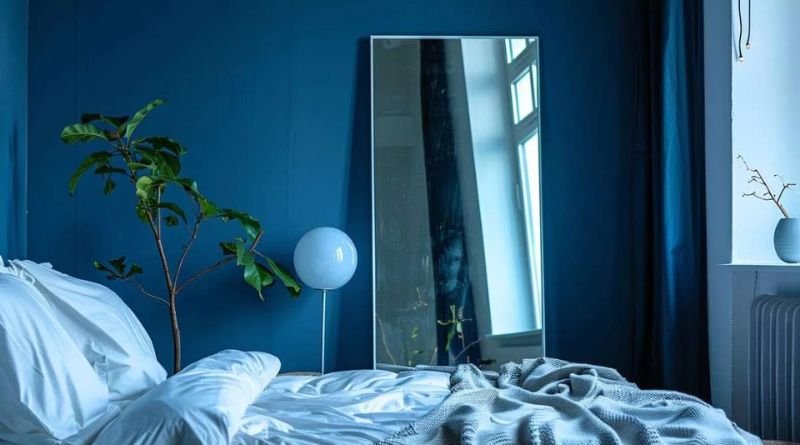The placement of mirrors in the home has long been a topic of debate, particularly when it comes to the practice of positioning a mirror directly opposite the bed. While many people may not think twice about where their mirrors are placed, some ancient philosophies, such as Feng Shui, warn that having a mirror facing the bed can have negative consequences. But is there any truth to this? In this article, we will explore the potential effects of having a mirror facing your bed, including the psychological, spiritual, and health-related implications.
The Beliefs Behind the Mirror Facing the Bed
1. Feng Shui Perspective
Feng Shui, the ancient Chinese art of arranging spaces harmoniously, has long cautioned against placing mirrors where they can reflect the bed. According to Feng Shui principles, a mirror facing the bed can disrupt the flow of energy, or “chi,” in the room, leading to restless sleep, disturbed dreams, and a general sense of unease. It is believed that the mirror’s reflective surface can cause the energy around the bed to become chaotic, leading to a disturbed or fragmented state of mind. Moreover, the mirror is thought to reflect the energy of the sleeping person, potentially leading to feelings of vulnerability or discomfort.
2. Psychological Impacts
Psychologically, the idea of a mirror facing the bed can induce feelings of unease or anxiety. When you wake up in the middle of the night and see your own reflection, it may be startling or disorienting, particularly if you’re not expecting it. This can create a sense of unease, causing you to feel anxious or even unsafe. In some cases, people with certain anxiety disorders may find that mirrors facing the bed exacerbate their feelings of nervousness or tension during sleep.
3. Sleep Disruption
Some research suggests that the presence of a mirror in the bedroom can disrupt sleep patterns, though the science is still inconclusive. The visual stimuli from a mirror—especially if it’s large or positioned in such a way that it’s visible throughout the night—could potentially cause the brain to remain more alert. In the dark, your mind might be hyper-aware of the reflection, which could prevent you from reaching deeper, more restful sleep stages. Even if you’re not consciously aware of the mirror, your subconscious might still be affected by it.
4. Spiritual and Cultural Beliefs
In some cultures, mirrors are believed to have spiritual significance. For instance, in some traditions, mirrors are thought to attract spirits or energy. Having a mirror facing the bed is sometimes associated with attracting negative energy, or in some cases, spirits. In other cultures, mirrors are seen as portals to the spirit world, and reflecting one’s bed could create an open passage for entities to interact with the sleeper.
Is There Any Scientific Evidence?
While the psychological and cultural beliefs around mirrors facing the bed are compelling, there’s little scientific evidence to back up the claim that having a mirror facing your bed has a direct negative impact on health. However, studies on sleep quality generally point to environmental factors—such as noise, light, and room temperature—as more significant determinants of sleep quality. Still, the subjective experience of individuals may vary. Some people may find that mirrors make them feel anxious or uneasy, while others might not be bothered by them at all.
Potential Benefits of Having a Mirror in the Bedroom
Not all the effects of mirrors are negative. In fact, mirrors can have some positive impacts in certain situations. Here are a few potential benefits:
- Visual Space Expansion: Mirrors can create the illusion of a larger space, making a small bedroom appear more spacious and airy. This can contribute to a feeling of relaxation and comfort in a confined area.
- Aesthetic Appeal: A mirror can be a stylish addition to your bedroom decor. It can reflect light, brighten up the space, and enhance the overall design.
- Self-Reflection: On a deeper level, mirrors can be a tool for self-reflection and mindfulness. Some people use mirrors in the bedroom for personal growth, affirmations, or self-care rituals.
Tips for Proper Mirror Placement in the Bedroom
If you want to avoid the potential negative effects of having a mirror facing your bed, consider the following tips for proper placement:
- Avoid Direct Reflection of the Bed: If possible, place the mirror on a wall where it doesn’t directly reflect the bed, especially if it faces the sleeping area. Consider positioning it on an adjacent wall or a higher surface so that the bed isn’t mirrored while you sleep.
- Use Smaller Mirrors: Rather than large, floor-to-ceiling mirrors, opt for smaller, more discrete mirrors that can still enhance the room’s aesthetic without overwhelming the space.
- Cover the Mirror at Night: If you must have a mirror facing the bed but are concerned about its impact on your sleep, try covering it at night. You can use a fabric cover or curtain to block the reflection while you sleep.
- Experiment and Listen to Your Body: Everyone is different. Some people are perfectly comfortable with a mirror facing their bed, while others might feel uneasy. Pay attention to how you feel. If you notice that you sleep better when the mirror is covered or moved, then trust your instincts.
Frequently Asked Questions (FAQs)
Q1: Why is it bad to have a mirror facing your bed in Feng Shui?
In Feng Shui, a mirror facing the bed is thought to disturb the flow of energy, or chi, in the room. It’s believed to create an imbalance that can lead to restlessness, anxiety, or fragmented sleep.
Q2: Can a mirror really affect my sleep quality?
While there’s no conclusive scientific evidence to suggest that a mirror will directly affect sleep quality, some people report feeling uneasy or disturbed by a reflection in the bedroom. This could potentially lead to a less restful night’s sleep, especially for those prone to anxiety or discomfort.
Q3: Should I remove mirrors from my bedroom entirely?
Not necessarily. While mirrors facing the bed can have negative effects for some individuals, mirrors can also have positive impacts on the aesthetic and perceived space in a room. It’s about finding the right balance and placement that works for you.
Q4: What is the best placement for a mirror in the bedroom?
If you’re concerned about mirrors facing your bed, consider placing them on the wall opposite a window or an adjacent wall. Avoid positioning the mirror so that it reflects the bed, as this can create an unsettling feeling for some people. Alternatively, a smaller mirror placed high on the wall can add light and space without affecting your sleep.
Q5: How do I know if the mirror is affecting my sleep?
If you consistently feel anxious, disoriented, or uncomfortable when waking up and seeing your reflection, it might be worth considering the mirror’s placement. Pay attention to your emotional and mental state when you wake up. If it feels unsettling, try changing the mirror’s position to see if it helps improve your sleep.
Conclusion
Whether or not a mirror facing your bed is “good” or “bad” for your health largely depends on your individual experience and the cultural or philosophical lens through which you view it. While there is no definitive scientific proof that mirrors harm sleep or well-being, many people report feeling uneasy when confronted with their own reflection in the dark. If you find that a mirror disturbs your rest, consider repositioning it or covering it at night. Ultimately, your bedroom should be a sanctuary that supports your physical and mental well-being, and finding the right mirror placement is part of creating a peaceful environment.


